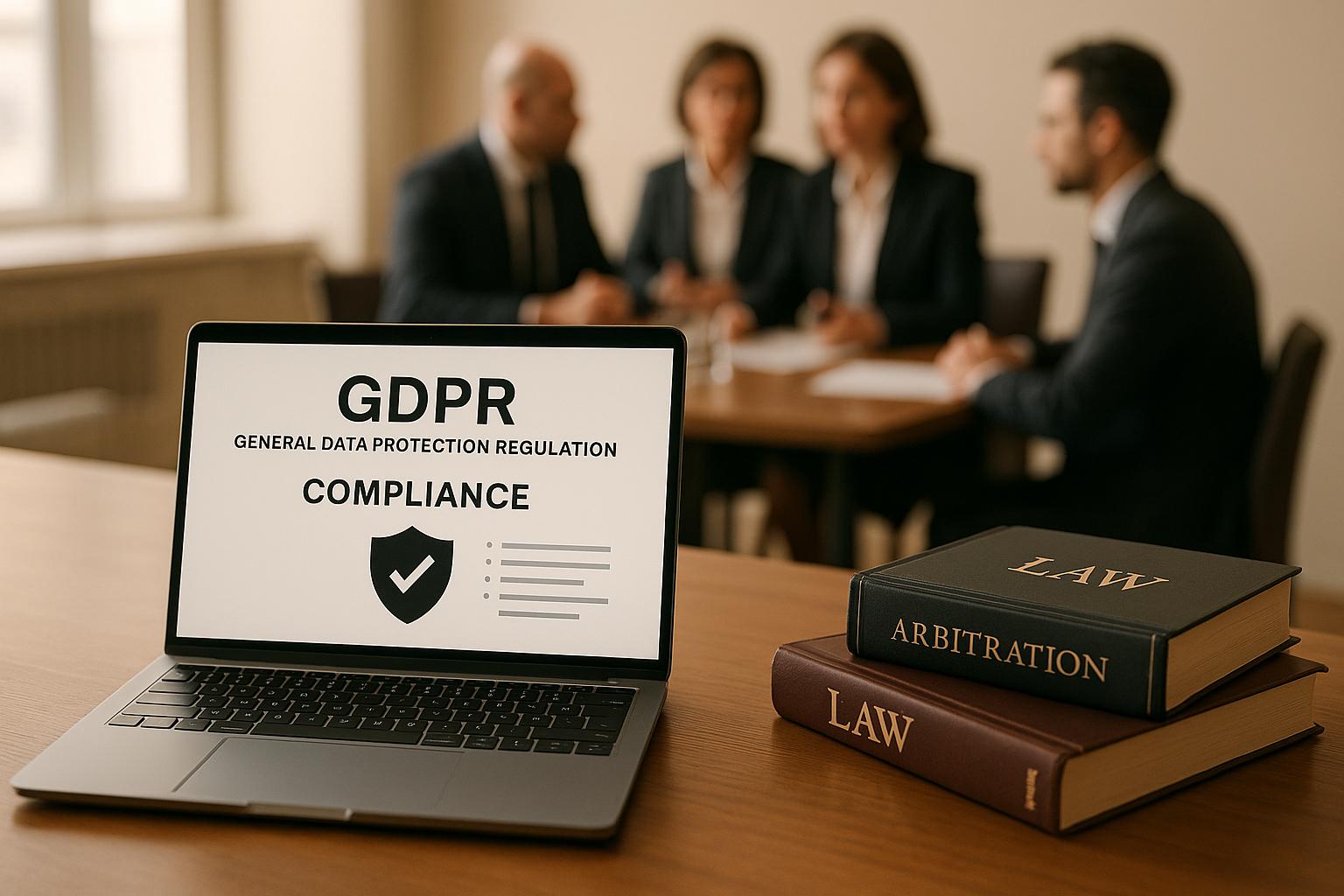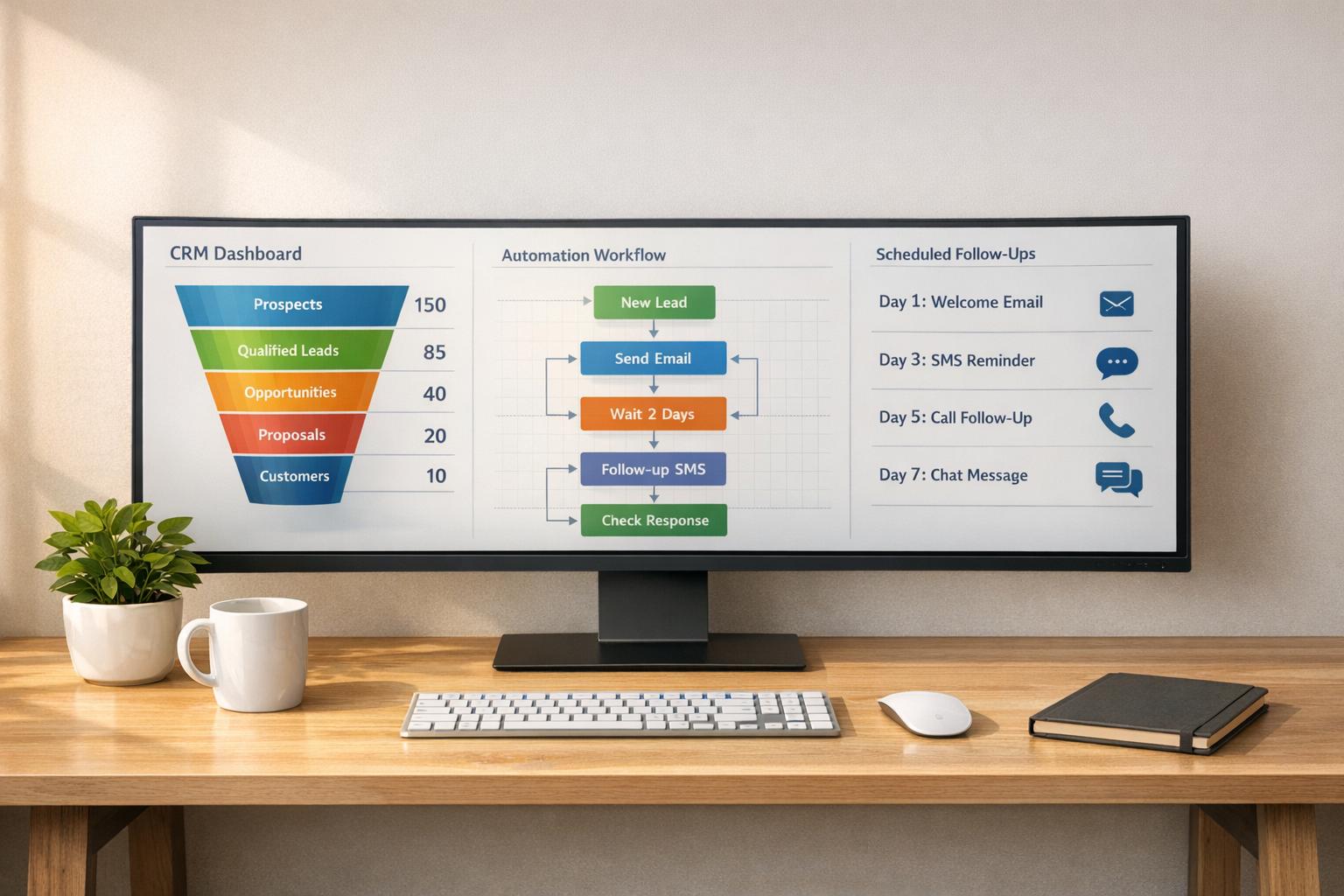GDPR and Arbitration in Data Disputes

Navigating data disputes across borders can be tricky, especially when the GDPR intersects with arbitration. The GDPR, effective since 2018, protects EU residents' data globally, while arbitration offers a private, quicker way to resolve disputes. However, combining the two raises questions about rights, enforcement, and confidentiality.
Key points to consider:
- GDPR Compliance: Arbitration must align with GDPR rules, including transparency and accountability.
- Confidentiality vs. Transparency: Arbitration is private, but GDPR demands openness about data use and dispute resolution.
- Enforcement Challenges: Arbitration awards must respect GDPR rights or risk being unenforceable in the EU.
- Technical Expertise: Arbitrators need knowledge of data protection laws and technologies.
While arbitration is faster and private, it can't replace GDPR enforcement by regulators. A hybrid approach - using arbitration for business disputes and regulatory mechanisms for individual rights - can strike a balance. The choice depends on urgency, complexity, and the need for confidentiality.
Data Protection and Cybersecurity in Arbitration: Risks and Opportunities | (Luther Lecture)
1. GDPR Compliance Requirements
When arbitration is involved in resolving data disputes, adhering to GDPR regulations becomes a critical responsibility. GDPR establishes key obligations for organizations, whether disputes are handled in traditional courts or through alternative methods like arbitration.
Cross-Border Applicability
The GDPR’s reach extends beyond the European Union, creating challenges for international businesses. Any organization handling the personal data of EU residents must comply with GDPR rules, even if the business operates entirely outside the EU. For example, U.S.-based companies must follow GDPR guidelines when processing data belonging to EU residents.
Cross-border disputes can complicate jurisdiction. Imagine a European individual filing a complaint against a U.S. company whose terms of service mandate arbitration in New York. While GDPR doesn’t prohibit such arrangements, it requires arbitration processes to uphold its principles, including the individual’s right to seek remedies through their local data protection authority.
Organizations also need to demonstrate accountability by documenting their compliance efforts and implementing proper technical and organizational safeguards. These compliance obligations remain in force during arbitration and can significantly shape how disputes are resolved.
Confidentiality
GDPR requirements often intersect with the confidential nature of arbitration, sometimes creating friction between the two. While arbitration proceedings are generally private and confidential, GDPR mandates transparency in specific areas, which can challenge traditional arbitration practices.
For example, companies must clearly communicate their data processing activities to individuals, including how disputes will be resolved. Articles 13 and 14 of the GDPR require organizations to inform individuals about arbitration clauses and their implications for data protection rights. This means companies cannot use arbitration’s confidentiality as a shield to withhold information about how personal data is processed.
Additionally, data protection authorities investigating GDPR violations may require access to arbitration-related documents. Arbitration confidentiality does not exempt organizations from regulatory scrutiny. Authorities retain their investigative powers, which may include reviewing arbitration records to ensure GDPR compliance.
Enforceability
Enforcing arbitration decisions under GDPR can present unique challenges. While international conventions like the New York Convention generally support the enforceability of arbitration awards, conflicts with GDPR principles can complicate matters.
If an arbitration decision violates GDPR requirements, enforcement in EU member states may be blocked. Courts may refuse to enforce awards that undermine fundamental data protection rights or fail to adequately protect individuals during the arbitration process. Arbitration clauses cannot override GDPR-protected rights, such as the ability to file complaints with supervisory authorities.
Moreover, Article 79 of the GDPR guarantees individuals the right to seek judicial remedies against data controllers and processors. This means that even if arbitration clauses exist, individuals can pursue parallel proceedings in national courts or through data protection authorities. Such overlapping actions may lead to conflicting decisions, further complicating enforcement.
Regulatory authorities also retain the power to impose fines independent of arbitration outcomes. Even if arbitration resolves a dispute between private parties, authorities can still levy penalties for GDPR breaches. These parallel mechanisms mean that arbitration alone cannot address all aspects of data-related disputes, leaving organizations with additional compliance responsibilities.
2. Arbitration Process
The arbitration process, built on the principles of GDPR, offers a specialized pathway for resolving data disputes. Unlike traditional court proceedings, arbitration in this context is tailored to handle the complexities of GDPR compliance.
Cross-Border Applicability
One of the unique challenges in arbitration for data disputes is its cross-border nature. The procedural laws often depend on the location of the arbitration, while the governing law of the contract may differ entirely. For example, a dispute between a German citizen and a U.S. company could involve arbitration in London, applying English procedural laws but governed by California state law for the contract itself.
To address these complexities, international arbitration rules - like those from the International Chamber of Commerce (ICC) or the London Court of International Arbitration (LCIA) - offer structured frameworks. These include provisions for emergency arbitrator appointments and expedited processes, which are particularly helpful in fast-moving data disputes.
The choice of arbitration venue is critical when GDPR principles are involved. EU member states often require arbitrators to integrate GDPR compliance into their decisions, while jurisdictions outside the EU might focus more on the contractual aspects. This variance can significantly impact how GDPR rights are enforced in arbitration.
Confidentiality
Arbitration’s hallmark of confidentiality can be both a strength and a challenge in GDPR-related disputes. On one hand, it allows parties to resolve sensitive data issues privately. On the other, GDPR’s transparency requirements may necessitate certain disclosures.
Arbitration institutions have adapted to these needs. For instance, the ICC’s rules permit parties to disclose arbitration details to regulatory bodies if legally mandated. This balance ensures compliance with data protection laws while maintaining the privacy of arbitration proceedings.
For individuals, confidentiality can be advantageous. Unlike public court proceedings, arbitration keeps personal data and dispute details private, safeguarding sensitive information while delivering effective resolutions.
Technical Expertise
Arbitrators in data disputes need a strong understanding of both data protection laws and the underlying technologies. General court proceedings often lack this specialized expertise.
To bridge this gap, arbitration institutions like the International Centre for Dispute Resolution (ICDR) have developed panels of experts with backgrounds in cybersecurity, data protection laws, and IT. These arbitrators are equipped to handle technical concepts such as data pseudonymization, encryption, and privacy-by-design standards. Their expertise enables them to assess whether technical safeguards align with GDPR requirements and to make informed decisions about data protection measures.
This level of technical understanding is essential for ensuring that arbitration awards are both practical and enforceable across jurisdictions.
Enforceability
The enforceability of arbitration awards in data disputes involves navigating international conventions and local data protection laws. The New York Convention, which governs the enforcement of arbitration awards globally, plays a key role. However, GDPR compliance can introduce additional hurdles.
EU courts, for instance, may refuse to enforce awards that fail to meet GDPR standards. Arbitrators must carefully align their decisions with GDPR to ensure smooth enforcement.
Complicating matters further, regulatory authorities can impose their own penalties for GDPR violations, independent of arbitration outcomes. This dual enforcement system means organizations must account for both the private arbitration results and the potential regulatory actions when resolving data disputes. Balancing these elements is crucial for achieving a comprehensive resolution.
sbb-itb-5f36581
Benefits and Drawbacks
Arbitration's structured process brings both advantages and challenges, especially when applied to cross-border data disputes under regulations like GDPR. Let’s break down how these factors shape outcomes.
Speed and Cost Efficiency
Arbitration often resolves disputes faster and at a lower cost than traditional court proceedings. This speed is particularly valuable during urgent situations like data breaches. However, hiring arbitrators with expertise in data protection can drive up costs. Despite this, the quicker resolution typically offsets the expense of specialized arbitrators.
Regulatory Enforcement
Even if arbitration resolves disputes between private parties, it doesn’t eliminate the oversight of data protection authorities. These regulators retain the power to enforce GDPR compliance, meaning arbitration alone doesn’t address all regulatory consequences.
Jurisdictional Complexity
Cross-border disputes, such as those involving a U.S. company and EU data subjects, create tough questions about which privacy laws apply. Arbitrators must navigate these conflicting legal frameworks while ensuring any decision is enforceable across borders.
| Aspect | Benefits | Drawbacks |
|---|---|---|
| Timeline | Faster resolution than courts | Limited options for appeals |
| Expertise | Access to technical specialists | Higher costs for expert arbitrators |
| Confidentiality | Protects sensitive information | May conflict with GDPR’s transparency goals |
| Enforcement | Easier recognition across jurisdictions | Regulatory bodies maintain independent power |
| Flexibility | Tailored procedures for specific cases | Inconsistent interpretations of GDPR |
| Cross-border | Simplifies multi-jurisdictional issues | Challenges in determining applicable standards |
Privacy Protection
One of arbitration’s standout benefits is confidentiality. For businesses handling sensitive personal data, private proceedings help protect customer trust and ensure personal information is not exposed during the dispute process.
Technical Complexity
Data disputes often involve intricate issues like encryption protocols, pseudonymization, and privacy-by-design principles. While arbitrators with specialized knowledge are essential for resolving these cases, finding the right experts can sometimes cause delays.
Precedent Limitations
Unlike court decisions, arbitration outcomes don’t set public precedents. This lack of transparent legal interpretation limits the development of industry-wide standards and provides less clarity for future GDPR-related disputes.
When drafting dispute resolution clauses, organizations must carefully weigh these factors. Arbitration offers speed, expertise, and confidentiality, making it ideal for routine privacy disputes. However, more complex cases might benefit from the public guidance and consistent legal framework provided by traditional litigation.
Conclusion
Resolving cross-border data disputes requires a tailored approach, as the best resolution method depends heavily on the type of conflict. The interplay between GDPR compliance and arbitration adds layers of complexity, but understanding how and when to use each can make a significant difference in the outcome of privacy-related disputes.
Arbitration works well for routine business disputes involving data processing, especially when speed and confidentiality are top priorities. For instance, companies navigating vendor agreements, data-sharing partnerships, or service provider conflicts often prefer arbitration for its efficiency compared to protracted court processes. The option to choose arbitrators with expertise in data protection also makes it a practical choice for addressing intricate privacy issues.
On the other hand, GDPR enforcement through regulatory bodies remains critical for addressing individual data rights, systemic compliance issues, or cases that set public precedents. As previously discussed, this method ensures accountability and aligns with GDPR’s broader goals of protecting individual data rights.
In practice, a hybrid approach often strikes the right balance. Businesses can include arbitration clauses for resolving business-to-business disputes while maintaining separate mechanisms for handling individual data subject complaints. This dual strategy allows companies to benefit from arbitration’s efficiency for commercial matters while staying compliant with GDPR’s protections for individual rights. It’s a way to resolve issues quickly without compromising on regulatory obligations.
When deciding on the right approach, several factors come into play: the urgency of the dispute, the need for confidentiality, the technical complexity of the issue, and the likelihood of regulatory involvement. It’s important to note that data protection authorities retain their enforcement powers, regardless of arbitration outcomes, making GDPR compliance an absolute requirement. Arbitration is particularly useful in international disputes, where conflicting jurisdictional laws can complicate matters, though it does not replace the need for GDPR adherence.
For companies managing personal data, success lies in combining arbitration for commercial disputes with robust GDPR compliance for individual rights. This dual approach provides the flexibility to handle conflicts efficiently while ensuring adherence to GDPR’s strict standards.
FAQs
How does arbitration comply with GDPR while protecting confidentiality?
Arbitration aligns with GDPR requirements by incorporating strict data protection practices while preserving confidentiality. This involves measures like confidentiality agreements signed by all involved parties, including arbitrators, and adherence to arbitration rules designed to securely manage personal data.
Arbitrators must also comply with GDPR principles, which means implementing strong security measures to protect sensitive information. This dual approach ensures personal data is safeguarded while maintaining the private nature of arbitration proceedings, fostering both legal compliance and confidence in the process.
What are the challenges of enforcing arbitration awards under GDPR in different countries?
Enforcing arbitration awards under the GDPR can get tricky, especially when dealing with different jurisdictions. This complexity stems from the fact that GDPR interpretation and application vary among European regulators. These differences can lead to clashes between arbitration decisions and regulatory enforcement actions.
Adding to the challenge, arbitration awards are notoriously hard to overturn. Typically, you can only challenge them on procedural grounds, leaving little room to address GDPR-related issues. The situation is further muddled by the lack of a unified approach to GDPR enforcement across countries. This inconsistency often leads to unpredictable outcomes when trying to gain cross-border recognition for arbitration awards.
How can businesses ensure GDPR compliance while using arbitration to resolve data disputes?
To navigate GDPR compliance in arbitration, businesses must implement solid data protection strategies from the outset. This includes providing clear data protection notices and designating data protection officers to monitor and guide compliance efforts. Arbitrators also play a key role by embedding GDPR principles - like transparency and safeguarding individuals' data rights - into their processes.
When arbitration practices align with GDPR standards, businesses can protect sensitive data, stay within legal boundaries, and continue to enjoy the advantages of arbitration, such as its adaptable and confidential nature.
Related Blog Posts
Get new content delivered straight to your inbox

The Response
Updates on the Reform platform, insights on optimizing conversion rates, and tips to craft forms that convert.
Drive real results with form optimizations
Tested across hundreds of experiments, our strategies deliver a 215% lift in qualified leads for B2B and SaaS companies.


.webp)



